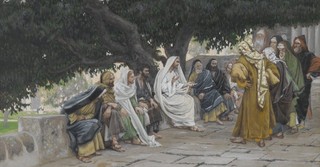What Does "Woe" Mean in the Bible?
Share

In the Bible, woe is far more than an expression of sadness; it is a solemn warning of grief and judgment. It marks the sorrow and consequences that come from rebelling against God the Father, God the Son, or God the Holy Spirit. When God pronounces woe, it is a certain promise of His holy justice, whether fulfilled immediately or in His appointed time.
Sometimes, a person declares woe over himself, confessing guilt and unworthiness before the Lord, as Isaiah did when he said, “Woe is me! For I am lost” (Isaiah 6:5). In every case, woe reminds us that rejecting God’s truth brings judgment, while turning to Him in repentance brings mercy and hope.
Photo credit: ©GettyImages/bestdesigns

What Does the Bible Say about "Woe"?
The Bible defines woe as an expression of grief or indignation. Other similar words are “alas!” or “Oh!" The idea is that the words coming out of the person’s mouth are passionate, full of grief and despair. Would grief and despair come when a person is in doubt about a terrible outcome? No, the prophet speaking the woe is sure of what he says. The grief of one casting woe on himself is a passionate response, yet he has hope that the Lord will redeem his woeful state(Job 10:15; Psalm 120:5).
The first time we see the word woe in Scripture is in Numbers 21:29, when woe is conveyed against Moab. That nation, which began by an incestuous union between Lot and one of his daughters, had no chance against Israel’s might. They were noted as being “undone, O people of Chemosh" (a false god Moab worshiped).
The succeeding uses of woe throughout the Bible follow this defined example.
Photo Credit: ©Arrangements-Photography

How Did Old Testament Prophets Pronounce "Woe"?
The Old Testament prophet, Isaiah, delivered a definitive woe when he uttered, “Woe to those who call evil good and good evil,” (Isaiah 5:20a). Isaiah adds more details about the woes that await all who rebel against the Lord by rejecting Him and twisting Scripture to suit their own selfish motives (vv. 20b-21).
The prophets Isaiah and Jeremiah spoke woe to Israel and other nations more than all other prophets in the Old Testament—both prophesied specifically to the southern kingdom of Judah (when Israel was divided).
To use these prophets as examples, the order we see in their books follows a usual format, where first they are identified as the Lord’s mouthpieces—their calling and authority as the Lord’s prophets is assured. 2 Peter 1:21 speaks of the Old Testament prophets, “For no prophecy was ever produced by the will of man, but men spoke from God as they were carried along by the Holy Spirit.” This is also proof of the Holy Spirit’s leading of the prophets.
Secondly, they were shown to be true once what they prophesied was fulfilled. Deuteronomy 18:20-22 tells us the great weight carried by a prophet of the Lord, “But the prophet who presumes to speak a word in My name that I have not commanded him to speak, or who speaks in the name of other gods, that same prophet shall die.’ And if you say in your heart, ‘How may we know the word that the LORD has not spoken?’— when a prophet speaks in the name of the LORD, if the word does not come to pass or come true, that is a word that the LORD has not spoken; the prophet has spoken it presumptuously. You need not be afraid of him.”
When they spoke of future events, especially of woe, often the people rejected their words and also the prophets themselves. Jeremiah, for example, was imprisoned for the words he brought against Judah. He lamented the destiny the nation’s rebellion was bringing, and he garnered the title the weeping prophet for their lack of reason and obedience regarding his prophetic message. Yet Jeremiah, and all God’s true prophets, endured—they remained faithful.
The life of a prophet was far from easy. Most endured much oppression from people who didn’t want to hear the woes decreed against them. And the manner the Lord manifested the upcoming woes was sometimes more than a prophetic word. The prophet Ezekiel had to lay on each side before a representation of Jerusalem for 390 days on one side and forty on the other to symbolize the coming years of woes against the city and people. He also had to bake his own bread using cow dung as the “baking stone” (Ezekiel 4). Such was his prophetic signs against the nation as ordered by the Lord God.
All the other prophets who spoke woe against rebellious people or evil nations followed along the same lines as Isaiah, Jeremiah, and Ezekiel, for the most egregious acts of men are those which deny the Lord God as sovereign over everything. At other times, the prophet (or people) declared woe upon themselves for wrong actions or beliefs (1 Samuel 4:7; Job 10:15; Psalm 120:5).
Photo Credit: © Getty Images/ Motortion

What Are the Seven "Woes" in Matthew 23?
As Jesus spoke to His disciples and the crowds, He pronounced judgment on the scribes and the Pharisees. The Bible uses seven most often to signify completeness. Here, the Lord Jesus is addressing the in-depth wickedness of many of the scribes and Pharisees. Jesus began His verdicts with a prologue. He said, “The scribes and the Pharisees sit on Moses’ seat, so do and observe whatever they tell you, but not the works they do. For they preach, but do not practice. They tie up heavy burdens, hard to bear, and lay them on people’s shoulders, but they themselves are not willing to move them with their finger” (Matthew 23:2-4).
With seven woes leveled against these Jewish leaders, Jesus warned His listeners and also the scribes’ and Pharisees’ followers against their evil deeds, as only Jesus in His perfect righteousness could.
Jesus began each judgment call with, “Woe to you, scribes and Pharisees, for you…” Each woe is outlined in the following list.
- V. 13. The scribes and the Pharisees are false instructors who sway people away from the kingdom. With their veiled knowledge, they speak lies to people and shroud the Way to the kingdom from them. They drew the people away from the kingdom of heaven instead of toward it.
- V. 15. The hypocritical scribes and Pharisees go out of their way to gather proselytes according to their tradition. The woe is they make their students “twice as much a child of hell as they are.”
- VV. 16-22. The scribes and Pharisees attempted an end-around regarding the law with a proviso for people who fully intended to not fulfill an oath or vow. If the people didn’t plan to make good on their oath, they could swear by the temple or the altar. Their supplement to the law indicted them, for unbreakable vows are ultimately made by the One who purifies the altar and temple. The Lord God is the ultimate witness to all oaths. A mere, sinful human attempt to change the standard indicts the bearer as in contempt of the Judge. Jesus punctuated this woe with, “And whoever swears by heaven swears by the throne of God and by Him who sits upon it” (cf. Matthew 5:33-37).
- VV. 23-24. The scribes and Pharisees followed one letter of the law” to the detriment of the other parts of the law, thus exhibiting unbalanced “weights,” and in their self-righteousness excluded justice, mercy, and faithfulness. In the screenwriter’s words of General Kemper from the movie, Gettysburg, the scribes and Pharisees had a gift for “trivializing the momentous and complicating the obvious.”
- VV. 25-26. The scribes and Pharisees wanted to please men by looking good on the outside when they were full of greed and self-indulgence on the inside. Jesus admonished them to undergo an inner cleansing, which, of course, could only come with surrender to and belief in Jesus as the Messiah.
- VV. 27-28. The righteousness of the scribes and Pharisees was false. Their outward beauty was nothing more than a cover over the unclean death they taught (against Christ). They were lawless hypocrites.
- VV. 29-36. Because they rejected Jesus, the scribes and Pharisees identified themselves with the ones who murdered the prophets. Jesus basically tells them to get on about their business because they will soon be judged anyway. They would be judged by the blood of the saints they so willingly indicated they’d have shed had they been given the chance, just as they were about to shed Jesus’ blood.
Photo credit: Public domain (James Tissot painting)

What Are the "Woes" in Revelation?
Revelation addresses the woes yet to be revealed and inflicted upon the unrepentant wicked.
The first woe mentioned in Revelation is in chapter 8, verse 13, “Then I looked, and I heard an eagle crying with a loud voice as it flew directly overhead, “Woe, woe, woe to those who dwell on the earth, at the blasts of the other trumpets that the three angels are about to blow!” This pronouncement follows the trumpet blast made by the fourth angel in 8:12. An eagle as seen in this passage denotes “fatal judgment descending from on high; the king of birds pouncing on his prey.” All this alludes to Christ’s divine majesty and His sovereignty to, at long last, destroy the wicked.
The first woe then comes to mankind via a plague of hideous-faced locusts who inflict scorpion-like stings for five months. People wish to die from the pain but God prevents their death.
The next woe we see revealed is noted in Revelation 9:12, which states the first woe has passed and behold, two more woes are to come.
The first of the two is illustrated as a vision of horses and their riders who bring plagues of fire, smoke, and sulfur with the horses’ mouths. A third of mankind was killed by the plagues, and those still alive did not repent of their evil practices.
The second woe comes via the two witnesses mentioned in Revelation 11. Many scholars believe these two witnesses are symbolic of the witness of Jesus Christ borne by His church during the last days. They endure hatred and persecution in Jerusalem until finally they are murdered by the “beast” (possibly the Roman Empire, as controlled by the devil). After three days lying dead in the “street” (so to speak), the Lord God revived them and they ascended to heaven. Then follows an earthquake that killed 7,000 people.
The third woe (presented as a noun in these passages of Revelation) came with the sounding of the seventh trumpet (denoting completeness), and God’s final wrath upon men who refuse to repent of their evil deeds (Revelation 11:15-19; 14:20; 16:18-19).
Photo credit: ©Getty Images/Ig0rZh

What Do the "Woes" of the Bible Mean for Us Today?
As we’ve learned, the Bible has much to say regarding the woes of unrighteous men and their actions.
But perhaps the greatest woe is found in two verses in Scripture: First, Paul writes, “Woe to me if I do not preach the gospel!” (1 Corinthians 9:16). Second, in Revelation 8:13, the voice of an eagle cries, “Woe, woe, woe to those who dwell on the earth, at the blasts of the other trumpets that the three angels are about to blow!”
Three things stand out to us about these two powerful verses:
- The Bible writers rarely used exclamation marks, and both of these verses end with them, indicating an urgency and strong consequences.
- In the verse from Revelation, woe is repeated three times. Any time we see a word repeated thrice within one verse in Scripture, it means we are to pay it the utmost attention as directly from the Lord. It’s as if the writer is saying, “Listen! Don’t miss this! Yield to what the Lord says before it’s too late!”
- The woes of both verses have to do with the Gospel—Jesus Christ. Paul declares woe upon himself if he doesn’t preach the gospel. That woe applies to Christians, too, because we are chosen by God; we are a royal priesthood and a people for God’s own possession, “that you may proclaim the excellencies of Him who called you out of darkness into His marvelous light” (1 Peter 2:9). As such, we also would declare woe upon ourselves if we don’t proclaim His excellencies—all found in the gospel.
As a highlight, Revelation 14:6 gives us a beautiful picture of an angel’s proclamation, “Then I saw another angel flying directly overhead, with an eternal gospel to proclaim to those who dwell on earth, to every nation, tribe, language, and people.” And with a loud voice the angel said, “Fear God and give him glory, because the hour of his judgment has come, and worship him who made heaven and earth, the sea and the springs of water.”
These verses from Revelation speak of the peoples’ lack of repentance, even given all the chances the Lord presented to them. Such was their woe. God’s patience will one day end (Revelation 15), and His final wrath will ensue. If He is drawing you to Himself, don’t wait another day and be full of woe, “For He says, “In a favorable time I listened to you, and in a day of salvation I have helped you.’ Behold, now is the favorable time; behold, now is the day of salvation” (2 Corinthians 6:2).
Photo Credit: ©iStock/Getty Images Plus/doidam10
